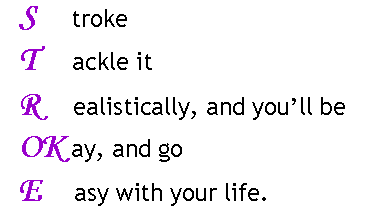|
Besides sharing the importance of complementary methods with cancer patients, I had also shared my knowledge with
stroke patients. I was invited by the Singapore National Stroke Association (SNSA) to deliver talks on "The Role of
Traditional Chinese Medicine in Managing Stroke" in Year 2002, "Managing Stroke With Complementary Methods" in Jan 2004 and
"Stroke Therapy Through Movement" in April 2004.
About SNSA
The aim of SNSA is to build up Community Support for stroke survivors and their caregivers and to provide support and
counselling services for post stroke adjustment. Please login http://www.snsa.org.sg
for more information.
 About SPD About SPD
The SPD-Singapore Power Rehabilitation Centre aims to complement hospital-based rehabilitation services for people who need continuing rehabilitative care after discharge from hospitals.
On top of those with congenital disabilities, the Rehabilitation Centre helps people who become physically disabled after an illness such as a stroke, or sustaining a serious injury arising from an industrial or traffic accident, or from complex medical and surgical conditions.
The "4-in-1" Approach In Managing Stroke
by Lee Soh Hong, founder of CancerStory.com
The sun rises and sets; the seasons come and go; people and other beings are born, live for some time, then die. Illness is
part of our natural life cycle and hence we must not regard illnesses as a misfortune. With courage and determination, we
can turn adversity into strength.
My mother's death marked a beginning, not an end that led to the "birth" of CancerStory.com, a non-profit web site that has
helped many local and overseas web surfers in the battle against cancer since its launch in September 2000.
To begin with, I would like to share the following "keywords" with stroke patients :

I always encourage patients and their caregivers to adopt a pro-active role in the management of their illnesses in order
to improve their quality of life and overcome the odds against their illnesses. I advocate a 4-in-1 approach, i.e. seeking
treatment (both mainstream treatment and Traditional Chinese Medicine), and adopting a proper dietary plan, a healthy
lifestyle and a positive attitude. Love and care from family members also help in the process of stroke recovery.
Nevertheless, healing takes time. Be patient and open-minded.
With a proper dietary plan, you can control the risk factors of stroke such as high blood pressure, obesity, high cholesterol
and unhealthy diets. Let your food be your medicine. The most healthful strategy will always be one that addresses the overall
diet, not single foods or supplements. Be skeptical of easy answers. It's human nature to look for quick fixes, or "magic
bullets" that solve health problems.
A healthy lifestyle will require one to give up smoking and alcohol consumption, and avoid the taking of birth control pills,
(each of these bad habits are risk factors of stroke). Without exception, stroke is one of those illnesses that arises from
our sedentary lifestyle. Hence, able-bodied patients are encouraged to engage in forms of exercise from which they can
continue to benefit from to a ripe old age, without causing damage to their joints. Some ancient form of health-preserving
exercises such as qigong, taiji quan and yoga can also be done in both lying and sitting positions. Hence nobody will be
deprived of the ability to exercise as long as one is determined and disciplined enough to want to get well through movement
therapy.
Stress has been named as the main "culprit" for most illnesses. If only our fellow men can re-define their sense of purpose
and priority, and stop chasing after materialistic things and unrealistic goals, living in Singapore won't be that stressful
in the end. Bear in mind that we come naked and will leave empty-handed. Of course, many will say that this is easier said
than done. However, if you are ready to change your mindset and let go, you will experience life from a new perspective and
start to lead meaningful lives like many long-serving volunteers in the various charities.
Instead of drowning in one's misery, maintaining a positive attitude and enjoying laughter, can help patients lead a better
quality of life or even a full recovery. The doctors call this a miracle.
Lastly, I would like to share the following quotation that was extracted from a healing book :
My symptoms alert me that my body needs more self-respect, compassion, and my focused attention. They may require that
I spend quality time with myself, or even guide me to change my direction and choices in life. I patiently accept my
symptoms as information, vibration, and pulsation, with a story to tell me about my life's journey.
Rehabilitation Centres
There are three main avenues for rehabilitation :
-
Acute hospital inpatient stroke rehabilitation programmes : Singapore General Hospital, Tan Tock Seng Hospital and Changi General Hospital.
-
Community hospitals : Ang Mo Kio Community Hospital, St Andrew's, St Luke's, Bright Vision Hospital and Kwong Wai Shiu Hospital.
-
Outpatient rehabilitation centres : Please visit http://www.ics.com.sg
Updated on 16 May 2005
|


 w.e.f. 1 Jan 2023.
w.e.f. 1 Jan 2023. 

